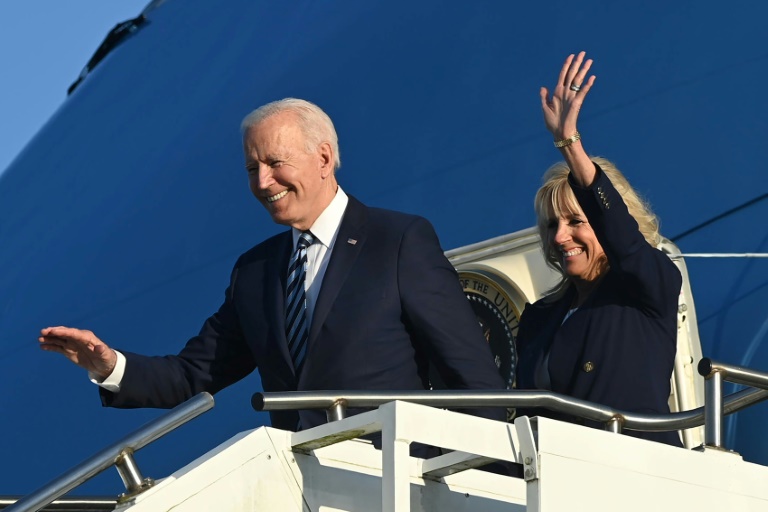Joe Biden triumphantly announced that “the United States is back!” as he kicked off his first overseas tour as US president, urging global collaboration and consensus to rebuild after Covid and reset diplomatic ties after the divisive isolation of the Trump era.
His multilateral charm offensive began even before he touched down in England for a packed week that takes in a G7 leaders’ meeting, summits with NATO and the European Union, and talks with his Russian counterpart Vladimir Putin.
On the way, Biden’s national security advisor Jake Sullivan told reporters aboard Air Force One that the president would kick things off with news of a major vaccine-sharing initiative.
Sullivan would not give full details, but US media reports said the Biden administration is set to buy 500 million doses of the Pfizer/BioNTech vaccine for international distribution.
Doses will be aimed at developing countries, he added, calling the US-led initiative “the right thing to do”.
“It’s what Americans do in times of need.
We were the arsenal of democracy in World War II. We’re going to be the arsenal of vaccines,” Sullivan added.
The Group of Seven will make a further joint declaration on “a comprehensive plan to help end this pandemic as rapidly as possible”, he said.
– ‘Tight’ transatlantic ties –
US armed forces personnel stationed at British Royal Air Force base Mildenhall in eastern England gave 78-year-old Biden and his wife Jill a raucous welcome after the presidential jet touched down.
The US leader is due to meet with British Prime Minister Boris Johnson on Thursday and the pair are set to agree a new version of the “Atlantic Charter”, the 1941 pact signed by Winston Churchill and Franklin D.
Roosevelt setting out post-war goals for democracy, trade and opportunity.
Biden will attend the G7 gathering in a Cornish seaside resort from Friday to Sunday, alongside the leaders of Britain, Canada, France, Germany, Italy and Japan.
Then, in rapid succession, he will visit Queen Elizabeth II at Windsor Castle and fly to Brussels for summits with the NATO military alliance on Monday and the European Union on Tuesday.
He will finish in Geneva to meet Putin next Wednesday.
With the world still crawling out from under the wreckage of Covid-19, Biden has cast his diplomatic marathon as a return to badly needed US leadership.
At RAF Mildenhall, he quoted the Irish poet WB Yeats’ “Easter 1916” — about the Irish rebellion against British rule — to sum up how the world had been “transformed utterly” by the global health crisis.
But he added: “At every point along the way, we’re gonna make it clear that the United States is back and democracies of the world are standing together to tackle the toughest challenges, and the issues that matter most to our future, that we’re committed to leading with strength, defending our values and delivering for our people.”
Bringing together “like-minded nations” is key, he said.
Biden’s pitch marks a return to traditional US diplomacy after four years during which his predecessor Donald Trump flirted with autocrats and recast multilateralism as a dirty word.
At his meeting with Putin, Biden said he would “let him know what I want him to know”, to loud cheers.
– ‘Wind at back’ –
However, some European partners, stung by Trump, may be sceptical about his pledge.
EU trade commissioner Valdis Dombrovskis called on the US to “walk the talk” when it comes to resolving lingering Trump-era trade disputes.
And there was friction last month when Washington blocked French attempts at the United Nations to demand a ceasefire between Israel and Hamas in Gaza.
Biden’s ramping up of vaccine donations also follows what critics saw as a long period of hoarding.
The US president’s meeting on the sidelines of NATO with Turkish counterpart Recep Tayyip Erdogan promises to be especially prickly.
Biden has irked Erdogan, who was sometimes a Trump ally, by highlighting Turkey’s dire human rights situation and recognising the Ottoman Empire’s genocide against the Armenians.
Washington risks “losing a precious friend,” Erdogan has warned.
– ‘More stable?’ –
Expectations for the Putin summit are so low that simply making US-Russian relations “more stable” would be considered a success, Secretary of State Antony Blinken and other White House officials say.
The White House sees the extension of the New START nuclear arms treaty in February as an example of where business can be done.
Biden also needs the Kremlin to make progress with Iran, which is close to Russia.
The list of tensions, however, is far longer.
Biden blames Russia for the massive SolarWinds cyberattack, election interference, and at the very least harbouring criminals behind ransomware attacks against the vital Colonial fuel pipeline and the US subsidiary of Brazilian meatpacking giant JBS.
Biden will also press Putin about sabre-rattling on the Ukrainian border, the imprisonment of opponent Alexei Navalny, and his support for Alexander Lukashenko, the Belarussian strongman who forced a Ryanair airliner to land in Minsk, then arrested an opponent on the flight.











